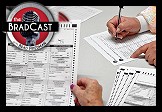Guest: Marilyn Marks of Coalition for Good Governance on that and new fake electors news; Also: Santos charged with 13 federal felonies...
 It's been quite the GOP crime wave this week on The BradCast. But today, in addition to that we've got some disturbing --- if not entirely unrelated --- kinda mind-blowing exclusive news out of a federal courtroom in the great state of Georgia. [Audio link to full show follows at the bottom of this summary.]
It's been quite the GOP crime wave this week on The BradCast. But today, in addition to that we've got some disturbing --- if not entirely unrelated --- kinda mind-blowing exclusive news out of a federal courtroom in the great state of Georgia. [Audio link to full show follows at the bottom of this summary.]
After quickly covering today's news on the 13-count federal indictment [PDF] filed in New York against Rep. George Santos (R-NY) for charges including wire fraud, money laundering, theft of public funds and making false statements to Congress, it's back to Georgia.
We have, for years now, been covering the long-running federal lawsuit challenging the use of the state's expensive, unverifiable, and --- according to one of the nation's top experts --- wildly vulnerable and insecure touchscreen voting systems.
The touchscreen Ballot Marking Device (BMD) systems made by Dominion Voting, currently in use in Georgia, were selected for use in 2020 by Republican Sec. of State Brad Raffensperger. He did so against the strong recommendations of cybersecurity and voting system experts following a ruling by a federal judge, in 2019, barring the further use of the state's previous touchscreen voting systems made by Diebold. U.S. District Court Judge Amy Totenberg found the previous systems to be unverifiable, insecure and, thus, unconstitutional. Unfortunately, instead of moving to a hand-marked paper ballot system at the time, as strongly recommended by experts, Raffensperger chose new touchscreen systems that had many of the same problems as the old ones.
The plaintiffs in the original federal case, Curling v. Raffensperger, quickly moved to bar the Dominion systems from being forced on every voter at every polling place in the state, as Raffensperger demanded. That suit continues. As part of it, Dr. Alex Halderman of the University of Michigan, an expert for the plaintiffs, was allowed to examine the Dominion touchscreen systems and found vulnerabilities so serious that Judge Totenberg sealed his complete findings, even from the plaintiffs! The U.S. Cybersecurity and Infrastructure Security Agency (CISA), however, was allowed to review Halderman's sealed report and made a list of critical software and physical security recommendations for the continued use of those systems in the battleground state.
Now, according to the transcript [PDF] from a hearing in Judge Totenberg's court last week in the Curling case, an attorney for the Sec. of State's office explained that while Dominion has completed CISA's recommended upgrades to the software and has had them certified for use by the U.S. Elections Assistance Commission (EAC) in late March, the state will not be installing those software upgrades until after the 2024 Presidential election.
As explained to the judge by the State's attorney Bryan Tyson, after spending hours "with the technical staff in the Secretary's office" and "hearing from folks with Dominion", it was determined that upgrades to the state's 35,000 touchscreen voting machines would be delayed until 2025.
"No jurisdiction has yet installed that upgrade...It has not been used in any election yet," Tyson told Judge Totenberg. "The upgrade process is a very intensive multistep process that involves multiple pieces of media, multiple components, and it involves touching every piece of the election system."
He explained that "every ballot-marking device has to have three different pieces of media installed on it to complete the upgrade. Every precinct scanner has to be upgraded. Every central count scanner has to be upgraded. And every election management server also has to either be replaced or upgraded. So, the implementation process for doing that is very involved."
According to our guest today, MARILYN MARKS of the Coalition for Good Governance, one of the plaintiffs in the Curling case, plaintiffs were stunned by the news. "You could hear gasps in the courtroom," she tells us today. "2025?! Immediately everyone thought, 'Presidential election, Georgia swing state.' We will have no way of knowing who won. And let's don't forget how much of a tinderbox Georgia was after the 2020 election. I believe it was a key part of the tinderbox that led to the insurrection. We're asking for it again."
There is, obviously, a lot to discuss on this matter with Marks today, including the most obvious point that, had Raffensperger listened to the experts and gone with hand-marked paper ballots, upgrading just one scanner per precinct for security reasons would have been a hell of a lot easier, faster, and cheaper, than upgrading every single voting machine --- 35,000 of them --- across the state.
"And we're not even beginning to talk about all of the warranty costs, maintenance costs, and printer costs and all that this system involves, when we're talking about just being a substitute for a ball-point pen," laments Marks. In addition to the time the State claims it will now take, she estimates the cost for upgrading the otherwise brand-new, $150 million system just purchased for first-time use in 2020 is likely to be in the tens of millions of dollars. "I don't think that $50 million and upwards is going to surprise anyone."
So, there is much more to discuss about all of this with Marks. Please tune in for the full conversation. But there was one more stunning bit of related breaking news from Marks today...
--- Click here for REST OF STORY!... ---



 Sunday 'Happyish Holidays' Toons
Sunday 'Happyish Holidays' Toons Trump Gets Trumped in Our Musky Year-End Roundtable: 'BradCast' 12/19/24
Trump Gets Trumped in Our Musky Year-End Roundtable: 'BradCast' 12/19/24 'Green News Report' 12/17/24
'Green News Report' 12/17/24
 About Some of Trump's 'Day One' Threats: 'BradCast' 12/18/24
About Some of Trump's 'Day One' Threats: 'BradCast' 12/18/24 Trump Family Corruption Cometh...So Does Our Opposition: 'BradCast' 12/17/24
Trump Family Corruption Cometh...So Does Our Opposition: 'BradCast' 12/17/24 'Green News Report' 12/17/24
'Green News Report' 12/17/24 Mistallied Contests Found in OH County, as Oligarchy Rises in D.C.: 'BradCast' 12/16
Mistallied Contests Found in OH County, as Oligarchy Rises in D.C.: 'BradCast' 12/16 Sunday 'Barrel Bottom' Toons
Sunday 'Barrel Bottom' Toons Trump Admits He Can't Lower Grocery Prices (Biden Just Did): 'BradCast' 12/12/24
Trump Admits He Can't Lower Grocery Prices (Biden Just Did): 'BradCast' 12/12/24 'Green News Report' 12/12/24
'Green News Report' 12/12/24 What 'Unprecedented and Powerful Mandate'?: 'BradCast' 12/11/24
What 'Unprecedented and Powerful Mandate'?: 'BradCast' 12/11/24 Trump Barely Won Natl'y, But Won 'News Deserts' By Landslide: 'BradCast' 12/10/24
Trump Barely Won Natl'y, But Won 'News Deserts' By Landslide: 'BradCast' 12/10/24 Bad Weekend for Authoritarians; Also: Pardon or Not?: 'BradCast' 12/9/24
Bad Weekend for Authoritarians; Also: Pardon or Not?: 'BradCast' 12/9/24 Fox 'News' and GOP Get Their Hateful War on Trans Kids at SCOTUS: 'BradCast' 12/5/24
Fox 'News' and GOP Get Their Hateful War on Trans Kids at SCOTUS: 'BradCast' 12/5/24 'Mind Boggles at Potential Corruption' in Trump Scheme: 'BradCast' 12/4/24
'Mind Boggles at Potential Corruption' in Trump Scheme: 'BradCast' 12/4/24 In Defense of Democracy from S. Korea to N. Carolina: 'BradCast' 12/3/24
In Defense of Democracy from S. Korea to N. Carolina: 'BradCast' 12/3/24 Hunter's Pardon: 'BradCast' 12/2/24
Hunter's Pardon: 'BradCast' 12/2/24 How (and Why!) to 'Extend Olive Branch' to MAGA Members: 'BradCast' 11/21/24
How (and Why!) to 'Extend Olive Branch' to MAGA Members: 'BradCast' 11/21/24
 VA GOP VOTER REG FRAUDSTER OFF HOOK
VA GOP VOTER REG FRAUDSTER OFF HOOK Criminal GOP Voter Registration Fraud Probe Expanding in VA
Criminal GOP Voter Registration Fraud Probe Expanding in VA DOJ PROBE SOUGHT AFTER VA ARREST
DOJ PROBE SOUGHT AFTER VA ARREST Arrest in VA: GOP Voter Reg Scandal Widens
Arrest in VA: GOP Voter Reg Scandal Widens ALL TOGETHER: ROVE, SPROUL, KOCHS, RNC
ALL TOGETHER: ROVE, SPROUL, KOCHS, RNC LATimes: RNC's 'Fired' Sproul Working for Repubs in 'as Many as 30 States'
LATimes: RNC's 'Fired' Sproul Working for Repubs in 'as Many as 30 States' 'Fired' Sproul Group 'Cloned', Still Working for Republicans in At Least 10 States
'Fired' Sproul Group 'Cloned', Still Working for Republicans in At Least 10 States FINALLY: FOX ON GOP REG FRAUD SCANDAL
FINALLY: FOX ON GOP REG FRAUD SCANDAL COLORADO FOLLOWS FLORIDA WITH GOP CRIMINAL INVESTIGATION
COLORADO FOLLOWS FLORIDA WITH GOP CRIMINAL INVESTIGATION CRIMINAL PROBE LAUNCHED INTO GOP VOTER REGISTRATION FRAUD SCANDAL IN FL
CRIMINAL PROBE LAUNCHED INTO GOP VOTER REGISTRATION FRAUD SCANDAL IN FL Brad Breaks PA Photo ID & GOP Registration Fraud Scandal News on Hartmann TV
Brad Breaks PA Photo ID & GOP Registration Fraud Scandal News on Hartmann TV  CAUGHT ON TAPE: COORDINATED NATIONWIDE GOP VOTER REG SCAM
CAUGHT ON TAPE: COORDINATED NATIONWIDE GOP VOTER REG SCAM CRIMINAL ELECTION FRAUD COMPLAINT FILED AGAINST GOP 'FRAUD' FIRM
CRIMINAL ELECTION FRAUD COMPLAINT FILED AGAINST GOP 'FRAUD' FIRM RICK SCOTT GETS ROLLED IN GOP REGISTRATION FRAUD SCANDAL
RICK SCOTT GETS ROLLED IN GOP REGISTRATION FRAUD SCANDAL VIDEO: Brad Breaks GOP Reg Fraud Scandal on Hartmann TV
VIDEO: Brad Breaks GOP Reg Fraud Scandal on Hartmann TV RNC FIRES NATIONAL VOTER REGISTRATION FIRM FOR FRAUD
RNC FIRES NATIONAL VOTER REGISTRATION FIRM FOR FRAUD EXCLUSIVE: Intvw w/ FL Official Who First Discovered GOP Reg Fraud
EXCLUSIVE: Intvw w/ FL Official Who First Discovered GOP Reg Fraud GOP REGISTRATION FRAUD FOUND IN FL
GOP REGISTRATION FRAUD FOUND IN FL


























 On today's
On today's  President Biden has, at his disposal, a simple, yet elegant solution to the Republican-manufactured debt ceiling crisis/hostage-taking effort.
President Biden has, at his disposal, a simple, yet elegant solution to the Republican-manufactured debt ceiling crisis/hostage-taking effort. 
 A decision by President Ronald Reagan to
A decision by President Ronald Reagan to  Democracy is not having an easy time of it of late, as both of our main stories on the always pro-democracy
Democracy is not having an easy time of it of late, as both of our main stories on the always pro-democracy 
 It's been quite the GOP crime wave this week on
It's been quite the GOP crime wave this week on  On today's
On today's 
 It was another deadly weekend in the violent state of Texas, thanks, in no small part to the Republican Party of Mass Murder. But on today's
It was another deadly weekend in the violent state of Texas, thanks, in no small part to the Republican Party of Mass Murder. But on today's 
 There was far too much news to fit into one
There was far too much news to fit into one 
 On today's
On today's 













